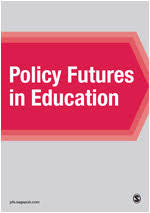
This special issue of Policy Futures in Education asks authors to imagine educational futures. What do education, school, teaching, learning, curriculum, and pedagogy look like 10, 20, 50, or 100 years from now? One way to think about these issues is futures studies. Based on work developed in the second half of the 20th Century (Bell, 1997; Dator, 2002), futures studies asks a series of questions, the most significant being: what is probable (what is most likely to happen); what is possible (what could happen); and what is preferable (what do you want to have happen)? Additionally, the best illustrations we have of futures thinking lie in science fiction, which often operates from a position of prefactual thinking – that is, anticipating what might happen should some future event occur. This is different from counterfactual thinking, in which the present is reimagined based on a past event (Sanna, 1996). Authors should adopt a prefactual perspective, and are encouraged to draw on examples from science fiction to imagine scenarios of the future of education.
Bell, W. (1997). Foundations of futures studies: Human science for a new era. Volume I: History, purposes, and knowledge. Transaction Publishers. Dator, J. A. (Ed.), Futures studies in higher education. Praeger. Sanna, L. J. (1996). Defensive pessimism, optimism, and simulating alternatives: Some ups and downs of prefactual and counterfactual thinking. Journal of Personality and Social Psychology, 71(5), 1020-1036.

Please see the full CFP before submitting an abstract. Proposals with a tentative title, 250-word abstract, and author(s) should be sent to Special Issue Editor, Dr. David W. Kupferman, assistant professor of educational foundations at Minnesota State University Moorhead by November 15, 2020. Full papers are to be submitted by February 15, 2021.
